Unit 9 第1课时 Section A(1a-2d)(课时课件)八年级英语下册同步精品课堂(人教版)
文档属性
| 名称 | Unit 9 第1课时 Section A(1a-2d)(课时课件)八年级英语下册同步精品课堂(人教版) |
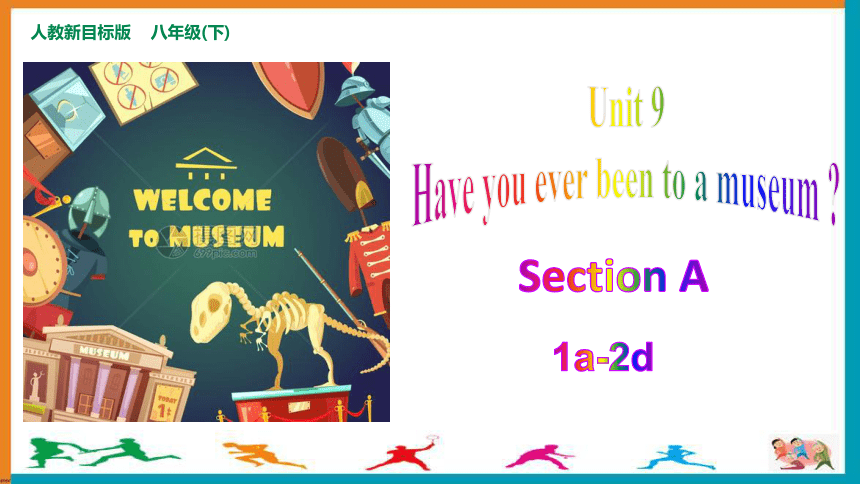
|
|
| 格式 | pptx | ||
| 文件大小 | 13.2MB | ||
| 资源类型 | 试卷 | ||
| 版本资源 | 人教新目标(Go for it)版 | ||
| 科目 | 英语 | ||
| 更新时间 | 2024-05-04 00:00:00 | ||
图片预览

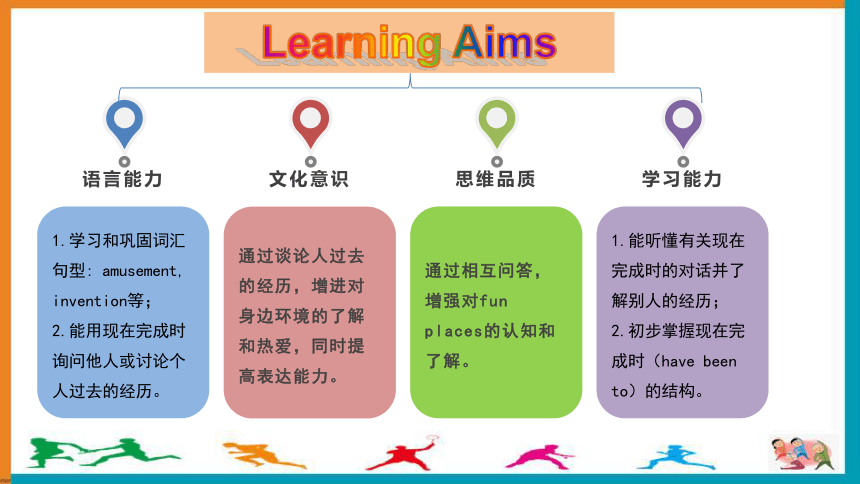
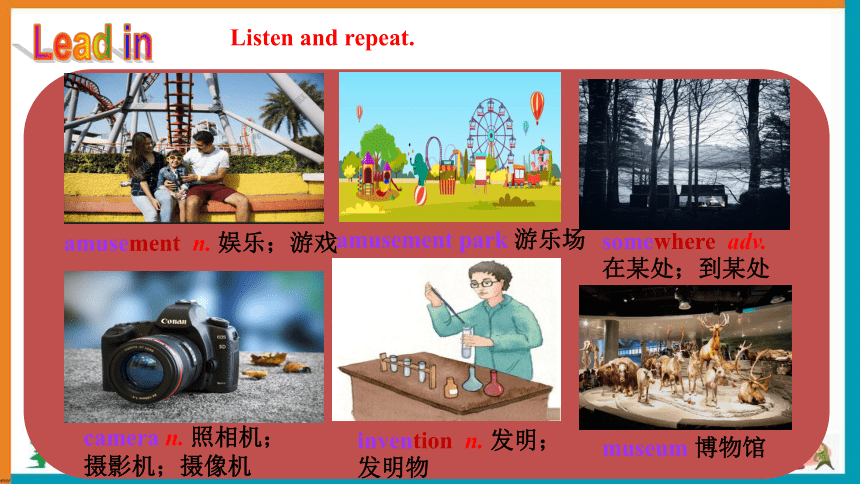


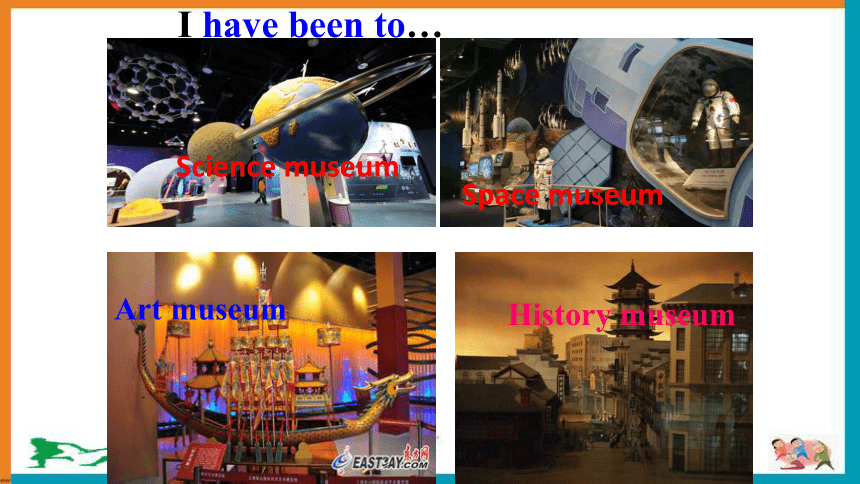
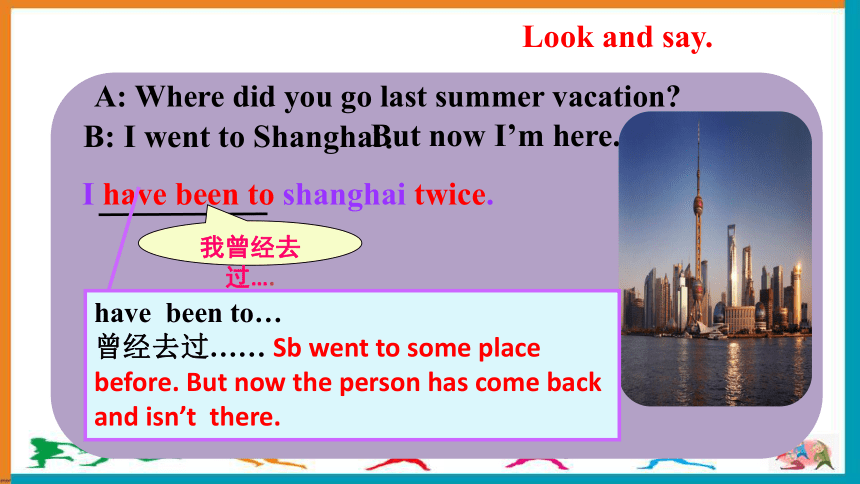
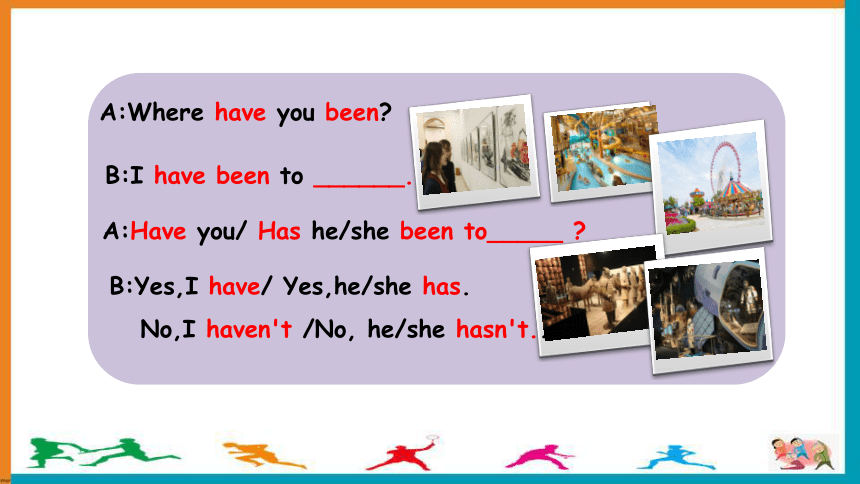
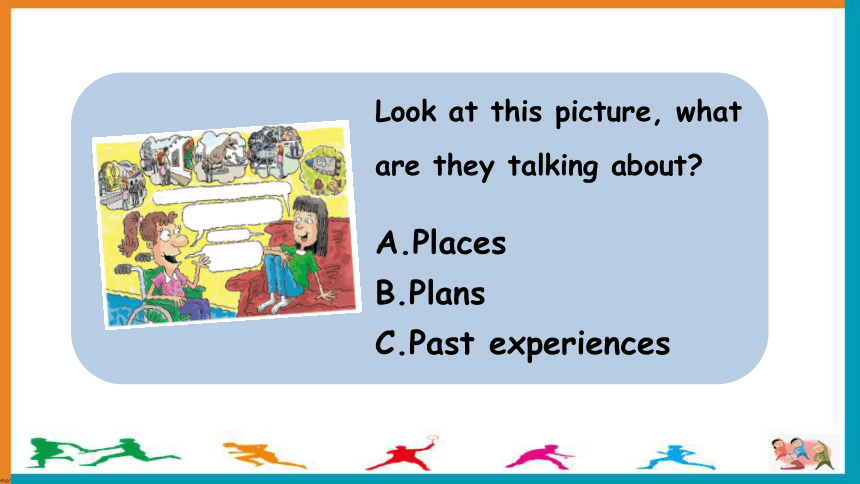

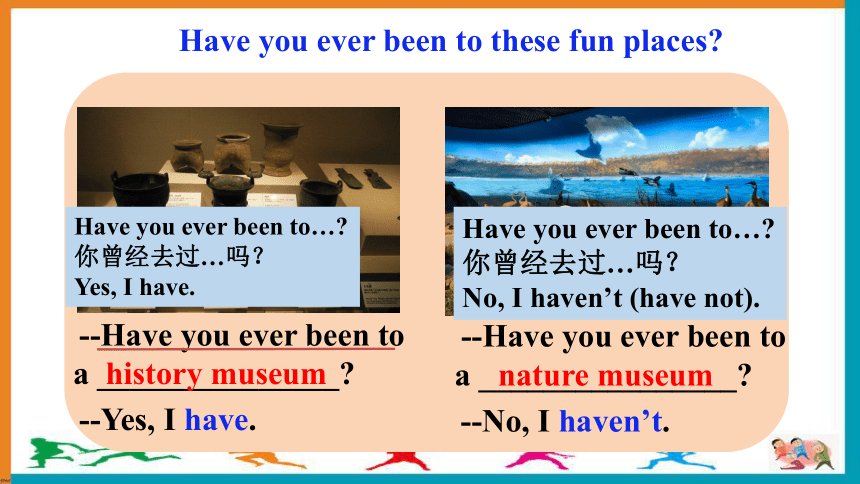
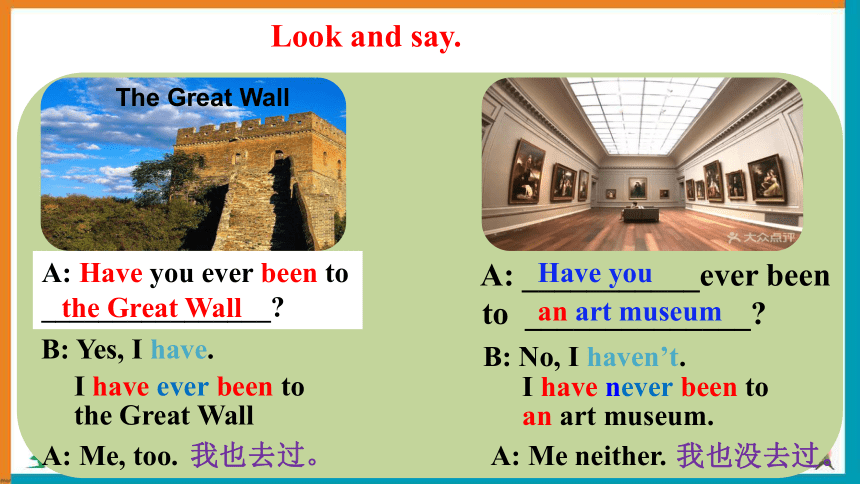
文档简介
(共62张PPT)
Section A
Unit 9
Have you ever been to a museum
1a-2d
人教新目标版 八年级(下)
1.学习和巩固词汇句型: amusement, invention等;
2.能用现在完成时询问他人或讨论个人过去的经历。
语言能力
通过谈论人过去的经历,增进对身边环境的了解和热爱,同时提高表达能力。
文化意识
通过相互问答,增强对fun places的认知和了解。
思维品质
1.能听懂有关现在完成时的对话并了解别人的经历;
2.初步掌握现在完成时(have been to)的结构。
学习能力
Learning Aims
Lead in
Listen and repeat.
amusement n. 娱乐;游戏
amusement park 游乐场
somewhere adv.
在某处;到某处
camera n. 照相机;摄影机;摄像机
invention n. 发明;
发明物
museum 博物馆
Guess
Where did I go
I went to Shanghai last year.
I have been to shanghai.
I have been to…
Water park
Zoo
Amusement park
There are many fun places in Shanghai!
Nature museum
I have been to…
History museum
Art museum
Science museum
Space museum
Look and say.
A: Where did you go last summer vacation
B: I went to Shanghai.
But now I’m here.
I have been to shanghai twice.
我曾经去过….
have been to…
曾经去过…… Sb went to some place
before. But now the person has come back
and isn’t there.
A:Where have you been
B:I have been to ______.
A:Have you/ Has he/she been to_____
B:Yes,I have/ Yes,he/she has.
No,I haven't /No, he/she hasn't..
Look at this picture, what are they talking about
A.Places
B.Plans
C.Past experiences
Look and say.
--Where have you ever been (你曾经去过哪里?)
--I have ever been to …
amusement park
space museum
art museum
I have never been to …
我 从来没去过…。
--Where have you never been
--I’ve never been to…
Have you ever been to these fun places
--Yes, I have.
--Have you ever been to
a _______________
history museum
Have you ever been to…
你曾经去过…吗?
Yes, I have.
--Have you ever been to
a ________________
nature museum
--No, I haven’t.
Have you ever been to…
你曾经去过…吗?
No, I haven’t (have not).
Look and say.
The Great Wall
A: Have you ever been to
________________
the Great Wall
B: Yes, I have.
I have ever been to
the Great Wall
A: Me, too.
我也去过。
A: ___________ever been
to ______________
Have you
an art museum
B: No, I haven’t.
I have never been to
an art museum.
A: Me neither.
我也没去过。
Which of the places would you like to visit Rank them
from 1(most) to 6 (least.)
space museum____ history museum___ art museum____
water park_______ zoo_______ amusement park___
1
4
6
2
3
5
B: Yes, I have. \ No, I haven’t.
A: Have you ever been to a\an…
1a
Look and say.
space museum
film museum
history museum
science museum
nature museum
art museum
Look and say.
Q: Have you ever been to a/an...
A1: Yes, I have. I went there...(时间)
A2:No, I have never been to a/an… Have you ever been to a/an…
an amusement park
a water park
a zoo
the Shaolin Temple
a science museum
a space museum
Listen. Have these students ever been to these places Check( )the boxes.
1b
Science museum History museum Art museum Nature museum Space museum
Claudia
Sarah
have been to … 去过……
Let’s say
Science museum History museum Art museum Nature museum Space museum
Claudia
Sarah
Claudia/Sarah (never) has been to an art museum/...
Where did they decide to go at last?
Space museum.
Has Claudia been to space museum?
Yes , she has.
Sarah: I'm bored, Claudia.
Let's do something interesting.
Claudia: Have you ever been
to a science museum
Sarah: Yes, I have. I went to
the National Science Museum
last year. Have you ever been
to a history museum
Claudia: No, I haven't.
Sarah: Me neither. Let's go to one tomorrow.
Claudia: Well, that sounds good, but I'm not interested in history.
Sarah: Really I didn't know that. Well,how about the art museum Have you been to the art museum
Claudia: I've been to the art museum many times.
Sarah: Me, too. But I'd like to
go again.Hmm, let's see .. how
about the nature museum I've been there a few times.
Claudia: So have I. I went there on our last school trip.
Sarah: I know. Let's go to the space museum. I've never been there.
Claudia: That's a great idea.
I went there last year, but I'd like to go there again.
Me,too. 我也是
Me, neither. 我也没有
Neither /Nor +助动词/情动/be + 主语
表示“...也不....”
So + 助动词/情动/be +主语
表示“...也...”
1c
A: Let’s go somewhere different today.
B: OK. Where do you want to go
A: Have you ever been to the space museum
B: No, I haven’t. How about you
A: …
Example:
A: Let’s go somewhere interesting today.
B: OK. Where do you want to go
A: Have you ever been to a water park
B: No, I haven’t. How about you
A:I have been there only once.
B: …
Look at the map of the town. Listen and circle the places you hear.
2a
Listen again and circle T for true or F for false.
2b
Conversation 1 Conversation 2 Conversation 3
1. Tina went to the space museum last year. T/F 2. John has never been to the space museum. T/F 3. They are going to take the subway. T/F 1. Linda has been to the amusement park. T/F 2. Linda went to the amusement park yesterday. T/F 3. Linda is going to the amusement park again by bike. T/F 1. Frank had a great
time at the water
park. T/F
2. Frank's friend has
never been to the
water park. T/F
3. Frank and his friend
are going skating.
T/F
Listen again and circle T for true or F for false.
听力策略:听前画关键词,听中抓关键词获取信息
1.Tina went to the space amusement last year.
2.John has never been to the space museum.
3. They are going to take the subway.
T F
T F
T F
Conversation 1
2b
Listen and repeat.
Conversation 1
John:Hey, have you ever visited the space museum, Tina
Tina:Yes, I went there last year. Have you ever been there, John
John:No, I haven’t.
Tina:Well, I’d really like to go there again.
John:Great. What bus do we take to get to the museum
Tina:We can take the subway. The station is near the museum.
Listen and repeat.
Conversation 2
Kim:Hi, Linda. Have you ever been to the amusement park
Linda:Yes, I have, but a long time ago. I remember it was really fun. There were so many exciting things to do there.
Kim:Do you want to go again next week
Linda:Sure. I think that would be a great idea.
Kim:Do you think we can ride our bikes there Linda:Of course! It’s not very far away. It’s just on Green Street, behind the zoo.
Listen and repeat.
Conversation 3
Tom:Have you ever been to the water park, Frank
Frank:No, I’ve never been there.
Tom:Neither have I. Let’s go there together!
Frank:I’d really love to go, but I don’t have any money.
Tom:Well,let’s go skating instead. There’s a great new place
for skating in River Park on Center Street.
Frank:That’s a great idea. Could I borrow your bike I want to
go home to get my skates.
While-listening
Post-listening
2c
A: Have you ever been to ________
B: Yes, I have. How about you
A: No, I haven’t. ( So have I /
Neither have I)
B: Oh, it’s________. let’s go
tomorrow.
A: OK. How________________
B: We can take the subway.
Example:
A: Have you ever been to an amusement park.
B: No, I haven’t. How about you
A: Yes, I have. It’s really interesting. Let’s go this weekend.
B: OK. How are we going to get there
A: We can ride our bikes there.
Post-listening
Post-listening
2d
Read 2d and answer the questions.
Where did Anna go last weekend
2.When did Jill go to the film museum
3. What does Jill love about the film museum
She went to the film museum.
In April.
She loves all the old movie cameras.
Post-listening
2d
Read 2d and answer the questions.
4.What did Jill learn at the film museum
5. What did Jill do on the weekend
6. Has Anna ever been camping
He learned about the inventions that
led to color movies.
She went camping.
No, she hasn’t.
Now let’s listen to a conversation between Anna and Jill, then answer the questions.
1. What do Anna and Jill talk about
2. What did Anna and Jill do last weekend
They talk about the things they did last week and their feelings.
Anna went to the film museum. Jill camped in the mountains.
Listen again and find out what they think of the activities they did last weekend.
Acitivity Who Feelings
went to the film museum Anna really _________
a great way ______________________
Jill love __________________________
camped in the mountains Anna sounds ____
Jill Anna should _____
interesting
to spend a Saturday afternoon
all the old movie cameras there
fun
try it
Close your book. Fill in the blanks according to your memory.
Anna went to the film museum ____________. She thinks the film museum is really _________. She has ______ been camping.
Jill wen to the film museum in _____. She loves all the old movie cameras, and she learned about the inventions that led to ___________. On the weekend, Jill ______ in the mountains with some friends.
last weekend
interesting
never
April
color movies
camped
Role-play the conversation.
2d
Anna: I went to the film museum last weekend. Have you ever been
there
Jill: Yes, I have. I went there back in April.
Anna: It's really interesting, isn't it It's a great way to spend a
Saturday afternoon.
Jill: Yes, I love all the old movie cameras there. I learned about
the inventions that led to color movies, too.
做......的好方法
learn about = learn of
了解;获知
lead to通向;导致;把......带到
Role-play the conversation.
2d
Anna: So, what did you do on the weekend
Jill: I camped in the mountains with some friends. We put up a tent and cooked outside.
Anna: That sounds fun. I've never been camping.
Jill: You should try it!
put up 建造;搭建
Language points
1. It is really interesting,isn't it?
此句为反义疑问句.
其结构为:陈述句+附加疑问句.
附加疑问句
当陈述句是肯定形式时,附加疑问句用否定形式.
前肯后否.
当陈述句是否定形式时,附加疑问句用肯定形式.
前否后肯.
回答方式:
事实是肯定,回答Yes.
根据回答的事实的真实情况回答。
事实是否定,回答No.
Language points
—— He didn't go to school last yeaterday,
didn't he
—— _______, though it rained hard yesterday.
A. No, he didn't
B. Yes, he didn't.
C. Yes,he did.
D. No, he did.
My father has been to Beijing twice.
Mr. Wang is not here. He has gone to Beijing.
They have been in Beijing for five years.
have/has been to sw 去过某地(人已回来)
have/has gone to sw 去了某地(人未回来)
have/has been in sw 在某地呆了多久(在/不在都可能)
后接地点副词时省掉介词,如home/here/there
2.have/has been to
have/has gone to
have been in
Language points
1. Have you ______ there
A. been to B. gone to C. been D. gone
2. Lucy isn’t at home now. She ____________ the USA.
3. My father ____________Shanghai for 8 days.
4. A: Where’s Jim, Li Lei
B: He ______________ his school library.
5. The Greens _____________ China for three years.
6. We _____________ the Great Wall twice. It’s very beautiful
C
has gone to
has been in
has gone to
have been in
have been to
3. Let’s go to one tomorrow.
句中one是代词,指代上文中谈到的a history museum。
I’m very interested in the toys. And I want to buy one.
我对这些玩具很感兴趣。我想买一个。
【辨析】 one与it
one指代上文提到的人或同类事物中的一个。one的复数形式是ones。
it指代上文提到的那个事物 。
My pen is broken. I want to buy one this afternoon.
我的钢笔坏了,今天下午我想买一支。
Jack caught a big fish this afternoon. Now he is cooking it.
今天下午杰克捕到一条大鱼,现在他正在烹饪它。
Language points
4. Let’s go somewhere different today.
somewhere different意为“不同的地方”。形容词修饰something、 anything等不定代词或somewhere、 anywhere等不定副词时,应该放在这些不定代词或不定副词的后面。
I want to go somewhere relaxing this summer.
今年夏天我想去个令人放松的地方。
Is there anything new in today’s newspaper
今天的报纸有新的东西吗?
Language points
5. spend的用法
① 在使用spend时,主语只能是表示人的名词或代词。例如:
Andy spent a lot of money on books.
Andy花了很多钱买书。
② 若表示“在......上花费(时间、金钱等)”,常用句型spend some
money/ some time on sth.,介词on后接名词或代词。
Kitty spends two hours on her homework every day.
Kitty每天花两个小时做家庭作业。
Language points
③ 若表示“花费(时间、金钱等)做某事”,则常用句型spend some money /
some time doing sth.,此时第二个动词要用动词-ing形式。
They spent 4,450 yuan buying the big color TV set.
他们买那台大彩电花了4 450元。
另外,spend也有“度过”的意思。例如:
They want to spend their summer holiday in the country.
他们想去乡下过暑假。
Language points
6. — Have you ever been to a history museum
— No, I haven’t.
— Me neither.
Me neither是英语口语中的常用表达,意思是“我也不(没)”,与Me too意思相对。
如:My friends are happy. Me too.
(1) 英语中表示后者与前者情形相同“也不……”时,常用neither引起的倒装句。其结构为:Neither+助动词/系动词be/情态动词+主语
e.g. I’m not tall. Neither is she.
= I’m not tall. She’s not tall, either.
我个子不高,她个子也不高。
(2) 如果表示后者与前者情形相同,“也……”常用so引起的倒装句。其结构为:
so+助动词/系动词be/情态动词+主语
e.g. My friends are happy. So am I.
= My friends are happy. I’m happy, too./ I’m also happy.
我的朋友高兴, 我也很高兴。
both 意为“两者都”,一般用于肯定的陈述句。与of连用作主语时,其后谓语动词用复数形式;作定语时,其后常跟名词的复数形式。
both / neither / either用法辨析
neither 意为“两者都不或两者中任何一个也不”,
表示“全否定”,与of 连用作主语时,其
后谓语动词用单数形式;作定语时,只修
饰可数名词的单数形式。
either 意为“两者中的任何一个”,用作主语时,
其后谓语动词用单数形式;用作定语时,
只修饰可数名词的单数形式。
Summary
记忆单词和短语
space museum, history museum, art museum, zoo, amusement park, science museum
2)掌握句型:---Have you ever been to a science museum
----Yes,I have.What about you
----Me too.
----Have you ever been to a history museum
----No,I haven't.What about you
----Me neither.
3)掌握含有been,ever,never的现在完成时的用法。
一、根据句意及汉语或首字母提示写单词
1. —What’s your plan for the coming holiday
—I want to go s interesting and relax myself.
2. [2023 济宁] Printing is a great ___________ (发明) of ancient China.
omewhere
invention
Exercises
3. —Squares in cities are popular places of ____________ (娱乐).
—I think so. So most of them are too noisy.
4. —I forgot to take a ___________ (照相机) with me, so I can’t take any photos.
—Oh, you can use mine.
5. [2023 苏州三模] David is crazy about Chinese history. He always visits __________ (博物馆) wherever he travels in China.
amusement
camera
museums
1. He doesn’t want to go a ________ boring to have his holiday.
2. So many teenagers like to go to a __________ park to have fun.
3. Paper making is one of the four great i _________ of ancient China.
二、根据句意及首字母提示补全下列单词。
nywhere
musement
nventions
Exercises
4. Nowadays almost every smart phone has a
great c _______ for people to take photos.
5. Lucy suggests we can go s _________ to have
a party this weekend.
amera
omewhere
三、单项填空
( )1. —I haven't been to the Great Wall. What about you
—________. I am planning to go there next weekend.
A. So did I B. Me neither
C. Me too D. Neither did I
B
( )2. —________ you ever ________ the science museum
—No, I haven't.
A. Do; visit B. Did; visit
C. Are; visiting D. Have; visited
( )3. It's impossible for you to see me in Guangzhou, because I've ________ been there.
A. already B. ever
C. yet D. never
D
D
( )4. —Lisa hasn't been to America, ________
—No, she hasn't. This will be her first time to get there.
A. does she B. doesn't she
C. has she D. hasn't she
( )5. —Where would you like to go on your summer vacation, Mike
—I'd like to go ________.
A. nowhere interesting B. interesting anywhere
C. somewhere interesting D. interesting somewhere
C
C
四、按要求改写下列各句。
1. They have bought a computer. (改成否定句)
____________________________________________
2. He has lost his book. (先改成一般疑问句,再作肯定与否定回答)
____________________________________________
____________________________________________
They haven’t bought a computer.
Has he lost his book
Yes, he has. No, he hasn’t.
五、用所给单词的正确形式填空。
1. —I ______ ever _______ (visit) the Great Wall. What about you
—I _______ (visit) it when I was ten years old.
2. Tom __________ (not be) to Disneyland and he ________ (go) there with
his parents this weekend.
3. —Where’s Zhang Peng
—He ________ (go) to our math teacher’s office.
—How soon ____ he _____ (come) back
—In a few minutes, I think.
4. —How long have you been ________ (study) in this school
—For more than two years.
have
visited
visited
hasn’t been
is going
studying
has gone
will
come
我都 学会了!
本课句型
Summary
You can either travel or read, but either your body or soul(灵魂) must be on the way.
要么读书,要么旅行,身体和灵魂,必须有一个在路上
Thank you !
人教新目标版 八年级(下)
Section A
Unit 9
Have you ever been to a museum
1a-2d
人教新目标版 八年级(下)
1.学习和巩固词汇句型: amusement, invention等;
2.能用现在完成时询问他人或讨论个人过去的经历。
语言能力
通过谈论人过去的经历,增进对身边环境的了解和热爱,同时提高表达能力。
文化意识
通过相互问答,增强对fun places的认知和了解。
思维品质
1.能听懂有关现在完成时的对话并了解别人的经历;
2.初步掌握现在完成时(have been to)的结构。
学习能力
Learning Aims
Lead in
Listen and repeat.
amusement n. 娱乐;游戏
amusement park 游乐场
somewhere adv.
在某处;到某处
camera n. 照相机;摄影机;摄像机
invention n. 发明;
发明物
museum 博物馆
Guess
Where did I go
I went to Shanghai last year.
I have been to shanghai.
I have been to…
Water park
Zoo
Amusement park
There are many fun places in Shanghai!
Nature museum
I have been to…
History museum
Art museum
Science museum
Space museum
Look and say.
A: Where did you go last summer vacation
B: I went to Shanghai.
But now I’m here.
I have been to shanghai twice.
我曾经去过….
have been to…
曾经去过…… Sb went to some place
before. But now the person has come back
and isn’t there.
A:Where have you been
B:I have been to ______.
A:Have you/ Has he/she been to_____
B:Yes,I have/ Yes,he/she has.
No,I haven't /No, he/she hasn't..
Look at this picture, what are they talking about
A.Places
B.Plans
C.Past experiences
Look and say.
--Where have you ever been (你曾经去过哪里?)
--I have ever been to …
amusement park
space museum
art museum
I have never been to …
我 从来没去过…。
--Where have you never been
--I’ve never been to…
Have you ever been to these fun places
--Yes, I have.
--Have you ever been to
a _______________
history museum
Have you ever been to…
你曾经去过…吗?
Yes, I have.
--Have you ever been to
a ________________
nature museum
--No, I haven’t.
Have you ever been to…
你曾经去过…吗?
No, I haven’t (have not).
Look and say.
The Great Wall
A: Have you ever been to
________________
the Great Wall
B: Yes, I have.
I have ever been to
the Great Wall
A: Me, too.
我也去过。
A: ___________ever been
to ______________
Have you
an art museum
B: No, I haven’t.
I have never been to
an art museum.
A: Me neither.
我也没去过。
Which of the places would you like to visit Rank them
from 1(most) to 6 (least.)
space museum____ history museum___ art museum____
water park_______ zoo_______ amusement park___
1
4
6
2
3
5
B: Yes, I have. \ No, I haven’t.
A: Have you ever been to a\an…
1a
Look and say.
space museum
film museum
history museum
science museum
nature museum
art museum
Look and say.
Q: Have you ever been to a/an...
A1: Yes, I have. I went there...(时间)
A2:No, I have never been to a/an… Have you ever been to a/an…
an amusement park
a water park
a zoo
the Shaolin Temple
a science museum
a space museum
Listen. Have these students ever been to these places Check( )the boxes.
1b
Science museum History museum Art museum Nature museum Space museum
Claudia
Sarah
have been to … 去过……
Let’s say
Science museum History museum Art museum Nature museum Space museum
Claudia
Sarah
Claudia/Sarah (never) has been to an art museum/...
Where did they decide to go at last?
Space museum.
Has Claudia been to space museum?
Yes , she has.
Sarah: I'm bored, Claudia.
Let's do something interesting.
Claudia: Have you ever been
to a science museum
Sarah: Yes, I have. I went to
the National Science Museum
last year. Have you ever been
to a history museum
Claudia: No, I haven't.
Sarah: Me neither. Let's go to one tomorrow.
Claudia: Well, that sounds good, but I'm not interested in history.
Sarah: Really I didn't know that. Well,how about the art museum Have you been to the art museum
Claudia: I've been to the art museum many times.
Sarah: Me, too. But I'd like to
go again.Hmm, let's see .. how
about the nature museum I've been there a few times.
Claudia: So have I. I went there on our last school trip.
Sarah: I know. Let's go to the space museum. I've never been there.
Claudia: That's a great idea.
I went there last year, but I'd like to go there again.
Me,too. 我也是
Me, neither. 我也没有
Neither /Nor +助动词/情动/be + 主语
表示“...也不....”
So + 助动词/情动/be +主语
表示“...也...”
1c
A: Let’s go somewhere different today.
B: OK. Where do you want to go
A: Have you ever been to the space museum
B: No, I haven’t. How about you
A: …
Example:
A: Let’s go somewhere interesting today.
B: OK. Where do you want to go
A: Have you ever been to a water park
B: No, I haven’t. How about you
A:I have been there only once.
B: …
Look at the map of the town. Listen and circle the places you hear.
2a
Listen again and circle T for true or F for false.
2b
Conversation 1 Conversation 2 Conversation 3
1. Tina went to the space museum last year. T/F 2. John has never been to the space museum. T/F 3. They are going to take the subway. T/F 1. Linda has been to the amusement park. T/F 2. Linda went to the amusement park yesterday. T/F 3. Linda is going to the amusement park again by bike. T/F 1. Frank had a great
time at the water
park. T/F
2. Frank's friend has
never been to the
water park. T/F
3. Frank and his friend
are going skating.
T/F
Listen again and circle T for true or F for false.
听力策略:听前画关键词,听中抓关键词获取信息
1.Tina went to the space amusement last year.
2.John has never been to the space museum.
3. They are going to take the subway.
T F
T F
T F
Conversation 1
2b
Listen and repeat.
Conversation 1
John:Hey, have you ever visited the space museum, Tina
Tina:Yes, I went there last year. Have you ever been there, John
John:No, I haven’t.
Tina:Well, I’d really like to go there again.
John:Great. What bus do we take to get to the museum
Tina:We can take the subway. The station is near the museum.
Listen and repeat.
Conversation 2
Kim:Hi, Linda. Have you ever been to the amusement park
Linda:Yes, I have, but a long time ago. I remember it was really fun. There were so many exciting things to do there.
Kim:Do you want to go again next week
Linda:Sure. I think that would be a great idea.
Kim:Do you think we can ride our bikes there Linda:Of course! It’s not very far away. It’s just on Green Street, behind the zoo.
Listen and repeat.
Conversation 3
Tom:Have you ever been to the water park, Frank
Frank:No, I’ve never been there.
Tom:Neither have I. Let’s go there together!
Frank:I’d really love to go, but I don’t have any money.
Tom:Well,let’s go skating instead. There’s a great new place
for skating in River Park on Center Street.
Frank:That’s a great idea. Could I borrow your bike I want to
go home to get my skates.
While-listening
Post-listening
2c
A: Have you ever been to ________
B: Yes, I have. How about you
A: No, I haven’t. ( So have I /
Neither have I)
B: Oh, it’s________. let’s go
tomorrow.
A: OK. How________________
B: We can take the subway.
Example:
A: Have you ever been to an amusement park.
B: No, I haven’t. How about you
A: Yes, I have. It’s really interesting. Let’s go this weekend.
B: OK. How are we going to get there
A: We can ride our bikes there.
Post-listening
Post-listening
2d
Read 2d and answer the questions.
Where did Anna go last weekend
2.When did Jill go to the film museum
3. What does Jill love about the film museum
She went to the film museum.
In April.
She loves all the old movie cameras.
Post-listening
2d
Read 2d and answer the questions.
4.What did Jill learn at the film museum
5. What did Jill do on the weekend
6. Has Anna ever been camping
He learned about the inventions that
led to color movies.
She went camping.
No, she hasn’t.
Now let’s listen to a conversation between Anna and Jill, then answer the questions.
1. What do Anna and Jill talk about
2. What did Anna and Jill do last weekend
They talk about the things they did last week and their feelings.
Anna went to the film museum. Jill camped in the mountains.
Listen again and find out what they think of the activities they did last weekend.
Acitivity Who Feelings
went to the film museum Anna really _________
a great way ______________________
Jill love __________________________
camped in the mountains Anna sounds ____
Jill Anna should _____
interesting
to spend a Saturday afternoon
all the old movie cameras there
fun
try it
Close your book. Fill in the blanks according to your memory.
Anna went to the film museum ____________. She thinks the film museum is really _________. She has ______ been camping.
Jill wen to the film museum in _____. She loves all the old movie cameras, and she learned about the inventions that led to ___________. On the weekend, Jill ______ in the mountains with some friends.
last weekend
interesting
never
April
color movies
camped
Role-play the conversation.
2d
Anna: I went to the film museum last weekend. Have you ever been
there
Jill: Yes, I have. I went there back in April.
Anna: It's really interesting, isn't it It's a great way to spend a
Saturday afternoon.
Jill: Yes, I love all the old movie cameras there. I learned about
the inventions that led to color movies, too.
做......的好方法
learn about = learn of
了解;获知
lead to通向;导致;把......带到
Role-play the conversation.
2d
Anna: So, what did you do on the weekend
Jill: I camped in the mountains with some friends. We put up a tent and cooked outside.
Anna: That sounds fun. I've never been camping.
Jill: You should try it!
put up 建造;搭建
Language points
1. It is really interesting,isn't it?
此句为反义疑问句.
其结构为:陈述句+附加疑问句.
附加疑问句
当陈述句是肯定形式时,附加疑问句用否定形式.
前肯后否.
当陈述句是否定形式时,附加疑问句用肯定形式.
前否后肯.
回答方式:
事实是肯定,回答Yes.
根据回答的事实的真实情况回答。
事实是否定,回答No.
Language points
—— He didn't go to school last yeaterday,
didn't he
—— _______, though it rained hard yesterday.
A. No, he didn't
B. Yes, he didn't.
C. Yes,he did.
D. No, he did.
My father has been to Beijing twice.
Mr. Wang is not here. He has gone to Beijing.
They have been in Beijing for five years.
have/has been to sw 去过某地(人已回来)
have/has gone to sw 去了某地(人未回来)
have/has been in sw 在某地呆了多久(在/不在都可能)
后接地点副词时省掉介词,如home/here/there
2.have/has been to
have/has gone to
have been in
Language points
1. Have you ______ there
A. been to B. gone to C. been D. gone
2. Lucy isn’t at home now. She ____________ the USA.
3. My father ____________Shanghai for 8 days.
4. A: Where’s Jim, Li Lei
B: He ______________ his school library.
5. The Greens _____________ China for three years.
6. We _____________ the Great Wall twice. It’s very beautiful
C
has gone to
has been in
has gone to
have been in
have been to
3. Let’s go to one tomorrow.
句中one是代词,指代上文中谈到的a history museum。
I’m very interested in the toys. And I want to buy one.
我对这些玩具很感兴趣。我想买一个。
【辨析】 one与it
one指代上文提到的人或同类事物中的一个。one的复数形式是ones。
it指代上文提到的那个事物 。
My pen is broken. I want to buy one this afternoon.
我的钢笔坏了,今天下午我想买一支。
Jack caught a big fish this afternoon. Now he is cooking it.
今天下午杰克捕到一条大鱼,现在他正在烹饪它。
Language points
4. Let’s go somewhere different today.
somewhere different意为“不同的地方”。形容词修饰something、 anything等不定代词或somewhere、 anywhere等不定副词时,应该放在这些不定代词或不定副词的后面。
I want to go somewhere relaxing this summer.
今年夏天我想去个令人放松的地方。
Is there anything new in today’s newspaper
今天的报纸有新的东西吗?
Language points
5. spend的用法
① 在使用spend时,主语只能是表示人的名词或代词。例如:
Andy spent a lot of money on books.
Andy花了很多钱买书。
② 若表示“在......上花费(时间、金钱等)”,常用句型spend some
money/ some time on sth.,介词on后接名词或代词。
Kitty spends two hours on her homework every day.
Kitty每天花两个小时做家庭作业。
Language points
③ 若表示“花费(时间、金钱等)做某事”,则常用句型spend some money /
some time doing sth.,此时第二个动词要用动词-ing形式。
They spent 4,450 yuan buying the big color TV set.
他们买那台大彩电花了4 450元。
另外,spend也有“度过”的意思。例如:
They want to spend their summer holiday in the country.
他们想去乡下过暑假。
Language points
6. — Have you ever been to a history museum
— No, I haven’t.
— Me neither.
Me neither是英语口语中的常用表达,意思是“我也不(没)”,与Me too意思相对。
如:My friends are happy. Me too.
(1) 英语中表示后者与前者情形相同“也不……”时,常用neither引起的倒装句。其结构为:Neither+助动词/系动词be/情态动词+主语
e.g. I’m not tall. Neither is she.
= I’m not tall. She’s not tall, either.
我个子不高,她个子也不高。
(2) 如果表示后者与前者情形相同,“也……”常用so引起的倒装句。其结构为:
so+助动词/系动词be/情态动词+主语
e.g. My friends are happy. So am I.
= My friends are happy. I’m happy, too./ I’m also happy.
我的朋友高兴, 我也很高兴。
both 意为“两者都”,一般用于肯定的陈述句。与of连用作主语时,其后谓语动词用复数形式;作定语时,其后常跟名词的复数形式。
both / neither / either用法辨析
neither 意为“两者都不或两者中任何一个也不”,
表示“全否定”,与of 连用作主语时,其
后谓语动词用单数形式;作定语时,只修
饰可数名词的单数形式。
either 意为“两者中的任何一个”,用作主语时,
其后谓语动词用单数形式;用作定语时,
只修饰可数名词的单数形式。
Summary
记忆单词和短语
space museum, history museum, art museum, zoo, amusement park, science museum
2)掌握句型:---Have you ever been to a science museum
----Yes,I have.What about you
----Me too.
----Have you ever been to a history museum
----No,I haven't.What about you
----Me neither.
3)掌握含有been,ever,never的现在完成时的用法。
一、根据句意及汉语或首字母提示写单词
1. —What’s your plan for the coming holiday
—I want to go s interesting and relax myself.
2. [2023 济宁] Printing is a great ___________ (发明) of ancient China.
omewhere
invention
Exercises
3. —Squares in cities are popular places of ____________ (娱乐).
—I think so. So most of them are too noisy.
4. —I forgot to take a ___________ (照相机) with me, so I can’t take any photos.
—Oh, you can use mine.
5. [2023 苏州三模] David is crazy about Chinese history. He always visits __________ (博物馆) wherever he travels in China.
amusement
camera
museums
1. He doesn’t want to go a ________ boring to have his holiday.
2. So many teenagers like to go to a __________ park to have fun.
3. Paper making is one of the four great i _________ of ancient China.
二、根据句意及首字母提示补全下列单词。
nywhere
musement
nventions
Exercises
4. Nowadays almost every smart phone has a
great c _______ for people to take photos.
5. Lucy suggests we can go s _________ to have
a party this weekend.
amera
omewhere
三、单项填空
( )1. —I haven't been to the Great Wall. What about you
—________. I am planning to go there next weekend.
A. So did I B. Me neither
C. Me too D. Neither did I
B
( )2. —________ you ever ________ the science museum
—No, I haven't.
A. Do; visit B. Did; visit
C. Are; visiting D. Have; visited
( )3. It's impossible for you to see me in Guangzhou, because I've ________ been there.
A. already B. ever
C. yet D. never
D
D
( )4. —Lisa hasn't been to America, ________
—No, she hasn't. This will be her first time to get there.
A. does she B. doesn't she
C. has she D. hasn't she
( )5. —Where would you like to go on your summer vacation, Mike
—I'd like to go ________.
A. nowhere interesting B. interesting anywhere
C. somewhere interesting D. interesting somewhere
C
C
四、按要求改写下列各句。
1. They have bought a computer. (改成否定句)
____________________________________________
2. He has lost his book. (先改成一般疑问句,再作肯定与否定回答)
____________________________________________
____________________________________________
They haven’t bought a computer.
Has he lost his book
Yes, he has. No, he hasn’t.
五、用所给单词的正确形式填空。
1. —I ______ ever _______ (visit) the Great Wall. What about you
—I _______ (visit) it when I was ten years old.
2. Tom __________ (not be) to Disneyland and he ________ (go) there with
his parents this weekend.
3. —Where’s Zhang Peng
—He ________ (go) to our math teacher’s office.
—How soon ____ he _____ (come) back
—In a few minutes, I think.
4. —How long have you been ________ (study) in this school
—For more than two years.
have
visited
visited
hasn’t been
is going
studying
has gone
will
come
我都 学会了!
本课句型
Summary
You can either travel or read, but either your body or soul(灵魂) must be on the way.
要么读书,要么旅行,身体和灵魂,必须有一个在路上
Thank you !
人教新目标版 八年级(下)
同课章节目录
- Unit 1 What's the matter?
- Section A
- Section B
- Unit 2 I'll help to clean up the city parks.
- Section A
- Section B
- Unit 3 Could you please clean your room?
- Section A
- Section B
- Unit 4 Why don't you talk to your parents?
- Section A
- Section B
- Unit 5 What were you doing when the rainstorm came
- Section A
- Section B
- Review of Units 1-5
- Unit 6 An old man tried to move the mountains.
- Section A
- Section B
- Unit 7 What's the highest mountain in the world?
- Section A
- Section B
- Unit 8 Have you read Treasure Island yet?
- Section A
- Section B
- Unit 9 Have you ever been to a museum?
- Section A
- Section B
- Unit 10 I've had this bike for three years.
- Section A
- Section B
